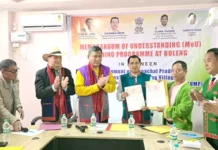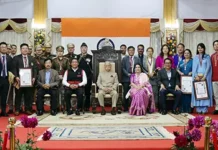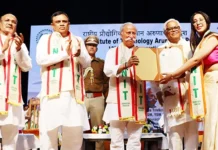Monday Musing
[ Tongam Rina ]
With state and parliamentary elections in a few months, Tirap has descended into the familiar cycle of violence and tragedy. Former MLA Yumsen Matey became the latest name in the long and growing list of the murdered when he was assassinated on 16 December afternoon near Raho village near the Indo-Myanmar border in Lazu circle.
The NSCN infested district has seen the murder of several high-profile persons, starting with Ajay Rajkumar, the brother of former legislative assembly speaker TL Rajkumar, in 1992, followed by former Arunachal East MP Wangcha Rajkumar in December 2007, and Tirong Aboh in May 2019, along with 10 others, that included his son and closest aide.
Tirap, one of the three NSCN stronghold districts, has consistently been violent prone as several factions engage in turf wars to control the lucrative drug and extortion market, and generally spread terror in order to reign.
It is very likely that the situation will remain unchanged as no one wants the status quo disturbed. The citizens will be caught in the same web of violence. They will be consoled each time violence hits, but we all know that words start to lose their meaning if no action follows.
Several factions of the NSCN are active in Tirap, Longding and Changlang – all instilling fear and violence in the name of greater Nagalim and Naga freedom while openly extorting from the government and citizens alike. The Armed Forces (Special Powers) Act, which has been imposed in the districts for decades now, has done little to curb violence. It has remained a tool for the armed forces to terrorise the citizens in the name of controlling militancy. In October 2023, the Act was renewed in Tirap, Changlang and Longding and the areas falling within the jurisdiction of Namsai, Mahadevpur and Chowkham police stations in Namsai district, along the Assam border, for another six months.
The six-monthly declaration of the AFSPA imposition is done by the Centre as the state government has no real power as the security of Arunachal is managed by the Centre and the governor under the provisions of Article 371 (H). The article does not grant any special provision or rights to the indigenous people of the state or its elected representatives. It grants special provision to the Centre, via the governor of Arunachal. The article gives extraordinary power to the governor in regard to law and order in the state. The article states that the governor shall take action after consulting the council of ministers, but in the same line it says that he “shall exercise his individual judgment as to the action to be taken.” The judgment of the governor cannot be questioned under the article.
There have been instances when the state government has been left clueless about the extension of the Act in the state. Though there are such technical limitations, it is time for Arunachal to seriously ponder what is going on in the TLC region. Even before the grieving period is over, another tragedy strikes, and it is very clear that thousands of central security personnel are not able to figure out what is happening in the districts. The statistics will be a good reminder to the state and the central agencies that it’s been the same cycle of failed investigation, announcements of rewards and prolonged court trials – most of them in the absence of the main accused. If one has kept record of the string of violence in the region, it is not difficult to conclude that the same people have been involved. Central agencies like the CBI and the NIA have not been able to deliver in Arunachal. One also has to ask why these organisations with terrible records are engaged time and again by the state and why demands for their engagement are made by unions and organisations too. A mechanism must be devised to engage the local police, as they are more aware of the local situations.
While the talks on the Indo-Naga negotiations have not moved forward, there has been no letup in violence in the three districts. It appears that peace has been lost forever. The festive season brings hope, but for the families that have been torn apart by violence, there is little hope for justice or closure.



